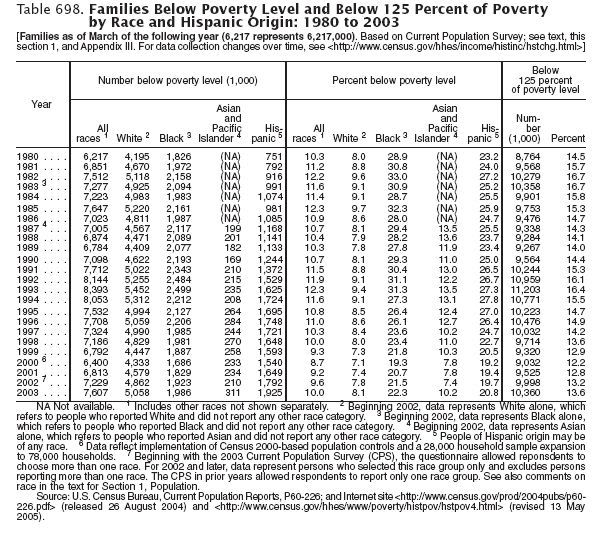brianeyci wrote:I thought about this a bit and it seems to me that the solution would be to just raise minimum wage but keep it below the equilibrium point. Therefore teenagers who don't really need it lose jobs, but the adults (25 years and older, .4 percent of the American population) who are working minimum wage get an increase in their purchasing power. Will you settle for that? Matching the 5.15 with inflation would keep it below the equilibrium you mentioned.
If not, why not.
Teenagers compete with unskilled adults for jobs. Your solution provides a competitive advantage to teenagers, and while it changes the nature of the market failure it does nothing to equilibrate markets.
If not, how about this. Suppose there is someone who does three dollars worth of work, person B. Person A hires him and the work still needs to be done, and because he doesn't want to break the law he hires him at 5.15. When the minimum wage is gone, he no longer has to pay 5.15 and so hires people for three bucks.
But he wouldn't have hired person B in the first place, because person B's work wasn't worth $5.15, before.
How did person A make money through this time? He made money, but he made less. Because there was somebody willing to work for less than B, but A couldn't hire him because of minimum wage laws.
No, under your scenario he lost money because person B's work is worth $3 and he was paying him $5.15.
I argue that with jobs at the minimum wage, the minimum wage is artificially holding up their wages above what they'd be worth. So if you remove the minimum wage, either inflation takes care of their wage and makes it worth its actual MRP, or they are fired and other people willing to work for the MRP are hired. Causing dilution of poor people's purchasing power.
Marginal revenue product is not something you can get around just by claiming that other people are willing to work for it. If someone isn't willing to work for their MRP's, then they will never work. Period. No business will pay anyone a wage that is greater than the amount of revenue that person brings in for the business--they would lose money by doing so. Similarly, no worker will need to work for less money than their MRP because if a business offered a wage less than their MRP, then another business would hire them for something higher.
As for lowering something resulting in job gains not following from raising something resulting in job losses, the answer's obvious both logically and empirically. A is raise minimum wage, B is job cut. A implies B, in other words raise minimum wage therefore job cuts. But the logical contrapositive is ~B implies ~A, in other words no job cuts means no raise in minimum wage.
Except that the minimum wage is the exogenous event, here. We have no control over exogenous job cuts.
The inverse, ~A implies ~B, no raise in minimum wage (axing minimum wage) means no job cuts (job gains), is not logically equivalent. Practically once those jobs are cut the businesses either find a way to adapt with the employees they have left (my efficiency point with the minimum wage) or they go out of business. Why would they want to hire more people when they have either figured out a way to survive with the higher wage or are gone?
Businesses would adopt more capital intensive models, and substitute capital for labor under your scenario. There are no market forces for locking them in to a particular resource mixture, and if one of their primary inputs becomes more expensive then they will change processes in the long run and use less of the more expensive resource.
I would like to know what kind of "sleeper" industries are dying to hire people at under the minimum wage at all, if they exist.
Virtually any industry should be able to gain some non-zero, positive benefit from hiring additional workers. It's just a matter of reducing their costs to the point where it is feasible for them to do so.
This really is the crux of your argument, and you haven't shown anything other than "raise minimum wage and there are job losses" (like duh I knew this) to show that "lower minimum wage and there are job gains" or "get rid of minimum wage and there are job gains" which doesn't logically follow.
Minimum wage reduces employment, and the elasticity is somewhere between -.1 and -.2, measured empirically. Elasticities work in either direction, albeit instantaneously, and so assuming linearity the elimination of the minimum wage would cut unemployment by over one half. Of course, this is not a reasonable measure because of the instantaneous nature of an elasticity, but removing the minimum wage would still serve to reduce unemployment in the economy.
I am also looking for a real world example of the minimum wage being gotten rid of and poverty levels going down. If not I will even settle for poor people not being hurt by minimum wage being removed. Inflation is besides the point because there are still people working at the minimum wage right now in America so it still exists.
Brian
But its effects have become negligible. It's difficult to find a country with the balls to actually remove the minimum wage because most people (like you) have absolutely no clue what the actual effects of a minimum wage are. Nonetheless, the example of the United States makes it pretty clear that there is no correlation between the minimum wage and poverty rates.
